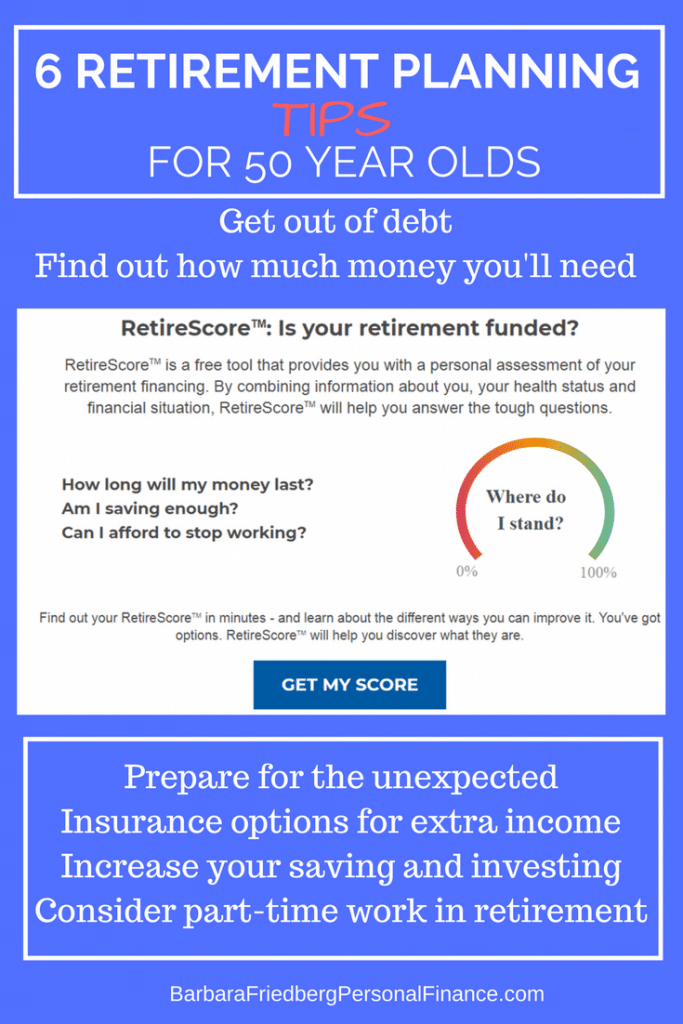Retirement Planning Action Tips for Today
You’ve hit the big 5-0 and the reality that you’re not going to work forever sinks in. If you’re like most Americans, your retirement account is on the lean side. A recent Economic Policy Institute article reports that for households between ages 50 and 55, the average savings balance is $124,831. Yet, all is not lost and at age 50, there’s still a solid 15+ years to go before retirement. With targeted planning, you’ve got time to craft a successful retirement.
Read on for 6 important retirement planning tips for 50 year olds:
Retirement Planning Tip #1 Get Out of Debt Today
I don’t want to hear any excuses. At age 50, if you have credit card debt, a home equity line of credit, a car note and a slim retirement account, then get rid of all debt except a first mortgage on your home. Debt offsets your wealth building efforts, and now is the time to kick those debt payments into high gear.
Your choice right now; drive a fancy car, buy a bunch of stuff, impress your neighbors, or have a successful retirement. Cut out the excess and make a commitment to paying off your debt now.
Retirement Planning Tip #2 – Find Out How Much You’ll Need to Retire
Have you avoided those retirement calculators that help you plan for retirement? If so, get your head out of the sand and block out a few minutes on your calendar to get your RetireScore and find out if your retirement is funded. Answer a few questions about your income, health and assets and you’ll get an estimate of whether you’re in good shape for retirement.
If you prefer the old school, pen and paper method. Go to SSA.gov and get an estimate of your Social Security benefit payments. Then add up your savings and investments. Estimate how much you expect to save before retirement and how much your investments will increase. The rest is easy. Take 3 percent of your expected retirement, investment and savings account totals and add that to your annual Social Security account benefit payments. If you can live on that amount, you should be set for retirement.
Retirement Planning Tip #3 – Prepare For the Unexpected
Stuff happens that you don’t expect and in retirement, it’s helpful to have extra funding for medical “what ifs”. Medical expenses average over $200,000 for retiree couples, so have a contingency plan in place in case you are hit with large medical bills.
Consider purchasing Long Term Care Insurance. Although expensive, long term care insurance (LTC) will help offset the costs of health care that aren’t paid for by Medicare or a Medicare Supplement Plan. LTC insurance covers part of the daily nursing home care bill or partially funds in home services. Before you sign, understand the plan details.
Retirement Planning Tip #4 – Investigate Insurance Options for Extra Income
There are a variety of insurance products that will increase your cash in retirement. An annuity can be an excellent product for some and annuities come in many varieties. For example, pay a lump sum to an annuity company and you can receive monthly payments for the rest of your life.
You can sell your life insurance policy for cash, if your kids are grown and you don’t need it anymore. In the same way that you might sell your big home and rent a smaller one in retirement, you can sell your insurance policy and use the proceeds to help fund your retirement. Whichever insurance product or products you choose, read the fine print and understand the costs.
Bonus; Should I Invest in an Annuity?
Retirement Planning Tip #5 – Increase Your Saving and Investing
With the kids out of the house, now is the time to take care of your own future. Whatever you do, don’t sacrifice your financial well being to support your adult children. You won’t be doing them or yourself any favors. Remember, they have decades to build their finances, and your time in the workforce is less.
The best way to bulk up your assets for retirement is by investing in a portfolio of low fee index funds. Have your bank automatically transfer a set amount each month into an investment account at Schwab, Fidelity, TD Ameritrade or your discount broker of choice. Select several low fee index funds, such as a diversified US stock fund, an international fund and a bond fund. Save and invest as much as you can for the next 15 or more years. That way, when you retire, your nest egg will be nice and fat.
{Just make sure not to have money in the stock market that you think you’ll need during the next three to five years – as investment markets are volatile.}
Retirement Planning Tip #6 – Consider Part-Time Work in Retirement
Working part-time in retirement is becoming very popular. Improved health and money are a few of the delightful benefits of part-time work. From putting in a few hours at Home Depot (my dream job), or starting your own consulting business, part-time work can be therapeutic.
It’s a good time to start pondering the next stage of your life while you’re still in the workforce. The American Association of Retired Personals claims that 40% of baby boomers expect to work in retirement. In fact, AARP has a whole section on their website devoted to work and jobs for seniors.
Age 50 is the ideal time to start plotting your next stage. Whether you have a fat retirement account or not, you still have several years to bulk up your financial assets and prepare for tomorrow.
Sponsored by Mason Finance



2 thoughts on “6 Retirement Planning Tips for 50 Year Old’s”
I love how you suggest getting out of debt as soon as possible to have a successful retirement. I think that a great way to get out of debt is to hire a financial planning service that can help you plan your retirement effectively. My dad wants to start planning for retirement, so I will pass along all of these tips to him.
Dear Charlotte, Even low interest rate debt can be stressful, as one heads into retirement :). Thanks for chiming in. Best, Barbara